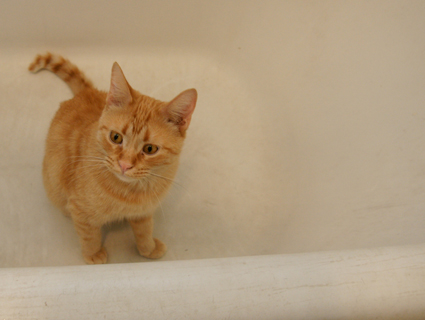
<a href="http://www.flickr.com/photos/nauright/4264340394/in/photostream/">romana klee</a>/Flickr
A new study suggests a link between infection with a cat-borne parasite and the risk of a suicide attempt—a creepy-sounding finding that actually fits with previous research on the pathogen, toxoplasma gondii. When rodents infected with t. gondii smell cat urine, they’re aroused rather than frightened, so they don’t run away—and then they get eaten.
That’s the parasite’s brilliantly evolved strategy to gain entry to the gut of a cat or other feline—the only place where it can complete its reproductive cycle, although it can survive inside many other species. In fact, eating contaminated and undercooked meat, not cleaning cat litter, is the main route through which Americans get infected, according to studies.
The Centers for Disease Control estimates that 60 million Americans have been infected with t. gondii. In many or most healthy people, infection is asymptomatic or accompanied by a mild flu-like illness. Yet the parasite has been found to lodge in multiple areas of the brain and can trigger inflammation, neurological dysfunctions, and other serious problems in people with impaired immune systems. Also, if a woman’s primary infection occurs during pregnancy, the infant can be born with a congenital infection that can lead to blindness, mental retardation and death.
However, a few recent studies have also associated t. gondii with an increased risk of schizophrenia and bipolar disorder, as well as suicide attempts.
The new study, published in the Archives of General Psychiatry, was the largest yet to examine the role of t. gondii and suicide. The researchers examined more than 45,000 Danish women who gave birth between 1992 and 1995 and whose infants were immediately tested for antibodies to t. gondii. A positive finding in the infant was presumed to indicate maternal infection at some point in the past; those mothers were almost twice as likely to have committed a violent suicide attempt by 2006 as those who were not infected, according to the study.
This was an observational study and not a randomized trial, and the overall number of such incidents was small; drawing conclusions about cause and effect can be difficult, if not impossible. And the researchers themselves stressed in remarks to the Los Angeles Times that worried pet-owners shouldn’t think of discarding their cats, given that most exposure is through meat.









